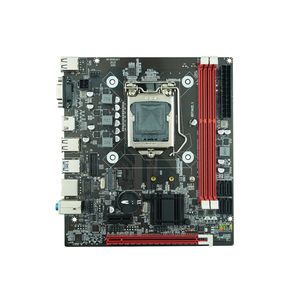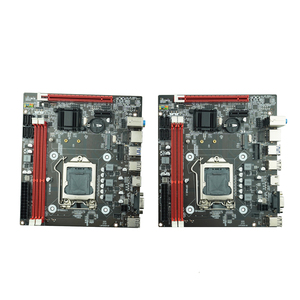(2625 products available)

















































































































 Ready to Ship
Ready to Ship
















































































A CPU card, also known as a central processing unit card, is a printed circuit board that holds the CPU and other vital components. Although there are many types of CPU cards, they mainly fall into two categories based on form factor.
ATCA CPU Cards
The Advanced Telecommunications Computing Architecture (ATCA) CPU cards are designed for high-performance and mission-critical applications in telecommunication systems. They support dual and multi-core CPUs and have interfaces for memory, storage, and connectivity. Their hot-swappable capability enables users to replace them without powering down the entire system. This enhances system availability and reduces downtime. Also, they comply with stringent reliability and availability standards like NEBS and TMAs.
AMC CPU Cards
The AdvancedMC (AMC) CPU cards are modular processor boards used in systems that require compact modules with high processing power. They are typically part of the MicroTCA and ATCA architectures. AMC CPU cards have a scalable architecture, allowing users to increase or decrease processing power based on application demands. They come with various processor options and support different memory technologies. Their small size makes them ideal for applications with space constraints, while their scalability fits various application needs.
CPU cards are versatile and evolving tools for cryptocurrency mining and digital payment services. They have various features that enhance their performance and functionality, enabling them to work efficiently amid increasing demand and preference for digital currency exchanges.
Software Support and Compatibility
The software support for a PC-based operating system is essential to a good score. Although this variable may not be quantified, it is undeniable that scores significantly depend on software optimization. The compatibility of the card with various mining software and operating systems maximizes mining performance and profitability.
Memory
High memory capacity enables it to process and execute mining operations faster and efficiently. The mining process requires large memory. Therefore, cards with higher memory capabilities are more efficient compared to those with lower memory capacity. The hash algorithm is primarily influenced by memory in PoW (Proof of Work) cryptocurrency.
Thermal Management and Cooling Solutions
Cooling mechanisms enable uninterrupted operations of CPU cards. Effective heat management is important in maintaining CPU, durability, and optimal performance. Mining involves continuous running of the CPU, thus generating more heat. Poor heat management may damage the CPU, leading to significant losses.
Power consumption
Power usage and efficiency is an essential factor to consider when choosing a CPU. It directly influences the profitability of mining operations. Inadequate power supply to the card may hinder its performance.
Crypto Mining
Crypto cards are used to mine crypto. Mining is an integral part of any cryptocurrency network. It is responsible for verifying transactions and adding them to the blockchain. Mining crypto creates new digital tokens. Since mining requires a lot of computational power, crypto cards with higher hash power can mine digital currency faster. The design features of a CPU card provide the necessary hash power to execute crypto mining activities.
Form factor
The form factor influences the performance and thermal management of a CPU. This enables buyers to choose a compatible option depending on their computing use. For instance, a small form factor is ideal for compact devices, while large ones are suitable for extensive computing tasks.
Performance
A high-performance card can be relied on to mine cryptocurrency faster and efficiently help fleets to function efficiently and flawlessly for longer periods without incurring huge costs due to maintenance and operational energy expenditures. Higher Return on investment is realized faster and with less work if one uses the faster-performing cards.
The CPU cards are used in various industries to carry out specific tasks and functions. Here are some key applications:
Selecting the right CPU card requires careful consideration of various factors to ensure compatibility, performance, and specific needs.
Compatibility with Systems:
Matching the CPU card to the computer's existing hardware is crucial. Look at the CPU card's socket type and ensure it matches the processor's socket to avoid compatibility issues. Check the supported processor architectures, such as Intel or AMD, to ensure they align with the current systems. Evaluate the card's chipset and features, making sure they integrate well with the motherboard and enhance functionality.
Applications and Performance Needs:
Identifying specific computing tasks helps determine the right CPU card. For general office tasks, a multi-core CPU card with balanced performance is sufficient. However, resource-intensive activities like 3D rendering or gaming require a high-core count and boosted performance CPU card.
Consider Form Factor and Features:
Choosing the right form factor ensures the CPU card fits well inside the PC case. Opt for the standard ATX for most builds, but micro ATX or mini ATX works better for compact setups. Check for extra features like overclocking support to enhance performance or integrated graphics, allowing usage without a separate GPU. Multi-core processor cards are great as they enable smooth multitasking and fast processing.
Budget and Vendor Reputation:
Establishing a budget ensures a CPU card is fully affordable. Evaluate the cost against features and performance to find the best value. Consider sourcing from reputable vendors known for quality and support to reduce risk and increase satisfaction. A review of the CPU cart paves the way for a conscientious buying decision.
Q: What is a CPU board?
A: A CPU card is a motherboard that houses the CPU along with the RAM, expansion slots, and connectors for peripherals.
Q: Can I upgrade the CPU on my CPU card?
A: It is possible to upgrade the CPU depending on the compatibility of the CPU card. One would have to check the CPU card specifications to determine compatibility.
Q: How do I know if a CPU card is compatible with my computer?
A: To determine compatibility, one would have to check the specifications of the CPU card to ensure it matches the requirements of the computer.